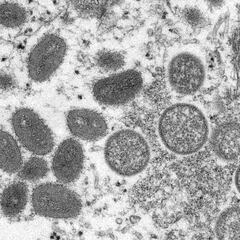Whooping cough wave: symptoms, treatment and how does it spread
Whooping cough cases have trebled in the U.S. this year. Here’s how to spot the symptoms.


There have been nearly 5,000 cases of whooping cough reported this year in the U.S. , according to the Centers for Disease Control and Prevention (CDC). That’s nearly three times as many as last year, though it’s important to note that it’s similar to the number seen in the years just before the covid-19 pandemic, which started in 2020.
Whooping cough, or pertussis, is a bacterial disease caused by the bacterium Bordetella pertussis or Bordetella parapertussis. The bacteria infect the lungs and breathing tubes of the patient. The disease spreads very easily.
What are the symptoms of whooping cough?
Whooping cough symptoms usually start around a week to 10 days after infection, but may not appear until 21 days later. The initial symptoms are similar to those of the common cold: sneezing, runny nose, mild fever and a mild cough. The infected individual will be contagious once these symptoms start (and may be contagious even if they are asymptomatic)
However, within 14 days of the initial symptoms, the cough may become much more severe. Typically, the patient will have episodes of numerous rapid coughs, followed by the high-pitched ‘whoop’ the disease is named for. After each bout of such coughing the affected individual may cough up thick, clear mucus. They may also vomit.
The coughing episodes tend to initially occur at night, becoming more frequent during the day. They can continue for up to two months.
In younger children, the ‘whoop’ may not occur; instead there may be periods where breathing stops after the severe coughing episodes.
It can take up to three months for the patient to fully recover.
When should I seek medical attention for whooping cough?
You should seek medical attention if an infant under six months has symptoms of whooping cough, or if you or your child has a severe cough that is worsening.
If you’ve been in contact with anyone with whooping cough or suspected whooping cough and you are pregnant you should speak to your health care provider. Equally, if you or your child has a weakened immune system and have been in contact with anyone with whooping cough or suspected whooping cough you should speak to your health care provider.
Seek urgent medical attention if you or your child’s lips, tongue, face or skin suddenly turn blue or grey; if you or they are finding it hard to breath properly; if you or your child has a chest pain that’s worse when breathing or coughing or if they are having seizures (fits).
How to prevent the spread of whooping cough
The best way to prevent the spread of whooping cough is not getting it in the first place, and the best way to do that is to be up to date with your whooping cough vaccine. It is part of the standard childhood vaccination program, so check that everyone in your family who should have been vaccinated has been.
The vaccine’s efficacy does weaken over time, so it’s vital to check with your doctor to makes sure those who need additional doses get them,
Taking precautions when sneezing and coughing is recommended to try and prevent the disease. Remember, people are infectious as soon as they get the cold-like symptoms and go on being contagious for up to three weeks after the cough starts. Cover your nose and mouth when you cough or sneezing and wash your hands frequently.
Related stories
Doctors may prescribe an appropriate antibiotic which after five days treatment should stop the patient being infectious.
Please note that the information in this article, while based on authoritative sources, is created and published for informational purposes only. It is not intended to be a substitute for professional medical advice and should not be relied upon as personal advice. Always seek the guidance of your doctor or health care provider for any questions or concerns you have about your health or medical condition.


Complete your personal details to comment